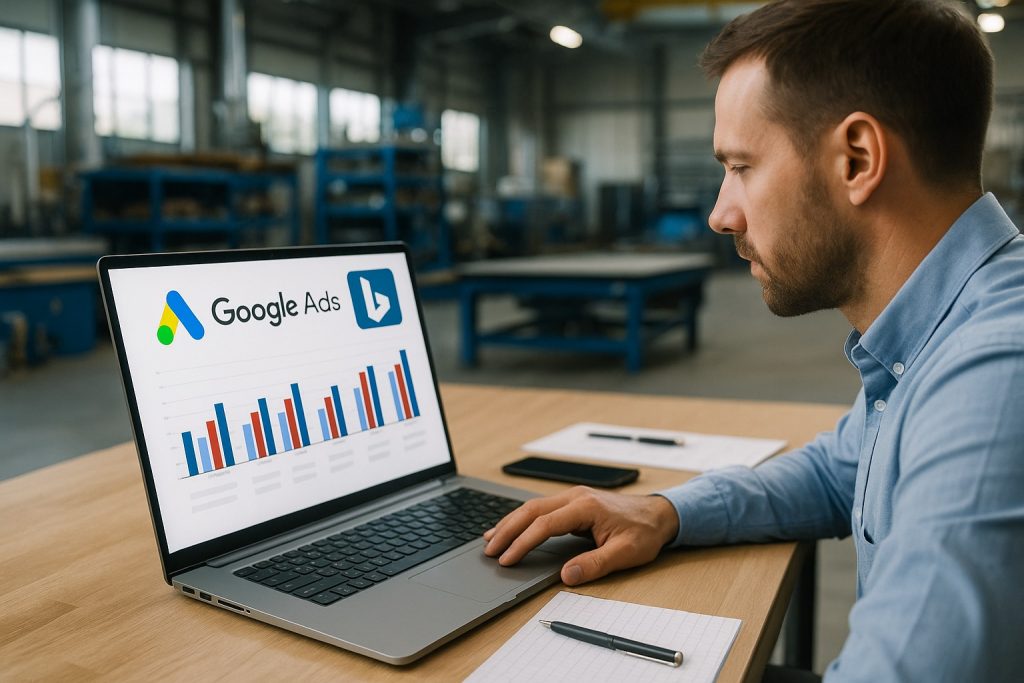Whether B2B buyers, engineers or managing directors – they all primarily use search engines such as Google and Bing to find new partners for the procurement of industrial goods and services.
For B2B manufacturers, service providers and retailers, SEA campaigns such as Google Ads and Microsoft Bing Ads have therefore long since ceased to be a secondary marketing channel, but rather central building blocks for effective, digital new customer acquisition.
The days when only B2C companies placed ads on Google and Bing are long gone. The search engine is ideal for profitable B2B lead generation in many industries.
We support you as a partner on this path, regardless of whether you already have current Google and Microsoft Ads accounts or are starting from scratch.
We look after you – from setting up the account and strategic keyword research to campaign planning and ad creation.

Google Ads and Microsoft Advertising are the two most lucrative search platforms when it comes to placing ads for B2B companies.
As a result of the generational change, employees and managers in the B2B environment search for information here when they are looking for a new supplier, product or industrial service.
You should therefore primarily be active and place ads on these two platforms.

If your company does not yet have a Google Ads account, one will be set up and linked to our administration account.

Positive and negative keyword research forms the basis for successful, budget-friendly campaign targeting.

We write sales-promoting ad copy for successful B2B industry campaigns. To make the results measurable, we also set up conversion tracking.

Your offer pages must be perfectly aligned with ad texts and keywords. We create briefings for your landing pages or implement them directly on your B2B website.

Your campaigns are ready and will be launched, managed and continuously optimized by us. We always keep an eye on them and readjust them.

To get even more out of your campaigns and your budget, we implement strategic retargeting & remarketing campaigns to retarget users.

“We are extremely satisfied with the services provided by Siegers Media. Robert Siegers helped us to strengthen our online presence in order to optimize the search engine ranking for our company. The adjustments to our homepage led to a significant increase in organic traffic.
The strategies were precisely adapted to the specific requirements of our company and taken into account.
Many thanks for the excellent collaboration!”
Arthur Weber
Sales Manager Sundwiger Messingwerk
“Very good guidance and advice on Google ads and SEO. The first ad campaign was carried out with little effort and full cost control for the client. The offer and billing of the services were transparent and flawless. Highly recommended.”
Ralf Wetzig
CEO Chemische Fabrik Kalk GmbH | K+S Gruppe
“It’s like a snowball effect […] we get more and more leads every month. Many thanks to Robert Siegers and the Siegers Media team!”
Marc Hütt
CEO MACK4D GmbH
“Thank you for the high-quality and reliable work! I can only recommend it to others!”
Gerald Schellmann
CEO GS Tele GmbH

“After some initial coordination difficulties, we settled in well. Working with Mr. Siegers was excellent throughout. He responded quickly to questions and always had time for a call. The development of our SEO results is very satisfactory.”
Jennifer Augustin
Senior Projektmanagerin Marketing Auktion & Markt AG

When we want to implement Google Ads and Bing Advertising campaigns for B2B companies, this presents us with special challenges. These require specific strategies and a deep understanding of the respective target group. Compared to the B2C sector, the requirements here are significantly more complex.
Long sales cycles are one of the main difficulties in B2B. It often takes months for a prospect to become a customer. During this time, SEA campaigns can be helpful to remind warm leads of your company via retargeting. The campaigns should be designed in such a way that they continuously accompany potential customers and build trust. Content such as whitepapers, webinars or case studies can help to ensure that potential customers keep your company in mind.
Added to this is the complex customer journey in the B2B sector, which involves numerous points of contact. This is because there is often not just one decision-maker involved in the decision-making process, but often three or four. In order to be present at every stage of the customer journey and with every decision-maker, a consistent approach is necessary. A synergy of SEO and SEA with social media or video platforms such as LinkedIn or YouTube can be useful here. At the same time, campaigns must be flexible enough to address the specific needs of decision-makers in the various decision-making phases.
As B2B target groups are often smaller and more niche and the search queries are highly specific, a precise keyword strategy is crucial. Niche and long-tail keywords that have less competition and indicate a clear intention to buy are particularly effective here and are the first choice for SEA campaigns. Examples of such keywords in the B2B sector could be:
“Buy CNC milling machine for aluminum”
“Industrial packaging systems for pharmaceuticals”
“Automatic conveyor systems for logistics centers”
“Welding robots for the automotive industry”
“Cooling water systems for power plants supplier”
These keywords target specific needs and industry applications, making them ideal for targeting relevant decision makers.
If you decide to invest in a professional Google Ads (SEA) agency, we will support you with the complete campaign implementation. From target group and keyword analysis to the live launch and management of the campaigns.
B2B SEA has advantages and disadvantages compared to other platforms and advertising channels:
Advantages of SEA:
Disadvantages of Google Ads:
If you are already running Google Ads successfully, we recommend taking the next step and becoming independent of Google Ads in the long term with the help of organic search engine optimization. Alternatively, you can also reduce your budget and set up a hybrid model between paid advertising and organic optimization.
Many! Combining SEA and SEO is a sensible strategy in B2B online marketing.
SEA offers quick visibility through paid ads and at the same time provides valuable data on the performance of keywords, target groups and search queries. These insights can be incorporated directly into the SEO strategy to improve organic rankings in the long term. Conversely, SEO can increase the click-through rate of SEA ads through well-optimized content and a strong organic presence, as a visible brand in both channels increases the trust of the target group.
In addition, the combination of SEO and SEA ensures that a B2B company is present in all phases of the customer journey – from the initial search for information to paid ads and long-term organic visibility. Together, these two disciplines maximize reach, efficiency and return on investment.
Let’s compare SEA (Search Engine Advertising) with SEO (Search Engine Optimization), i.e. the organic results on the Google SERPs.
You are always well advised to use SEA if you are aware that you will only get new customers for your industrial products as long as the ads are running. And they will only do so as long as you pay Google. If you stop the payment flow at some point, the search engine will no longer bring you new visitors. With Google Ads, however, you get immediate results and visibility.
SEO, on the other hand, often leads to new visitors very slowly at first. However, once you have taken the search engine positions, the flow of potential new customers for your products will continue for months to years. Bear in mind that the market, the search algorithm or your product range may change, which requires new SEO adjustments. Basically, however, with SEO you are independent of further expenditure. That is the big difference between SEO and SEA.
A hybrid model that combines both measures is ideal for most B2B companies.
Strategic buyers search for industrial products online these days. That is a fact. Due to the generational change and private consumer habits, B2B companies are now also forced to be visible online. Otherwise, they will miss the boat in the long term.
Hypothetical lost benefit:
So let’s assume you sell mass finishing machines to industrial companies at a price of 500.00 euros each.
A click on Google Ads for this explicit product currently costs you around 1.00 euro. If a buyer makes a product inquiry for every 100 clicks, a lead (qualified inquiry) costs you 100.00 euros.
This is far less than the potential revenue per mass finishing machine sold. In this case, Google Ads are absolutely worthwhile and profitable.
The next step: Become a digital pioneer in your industry and stay one step ahead of your competition.